Related Research Articles
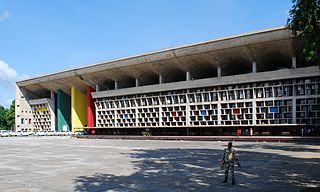
Punjab and Haryana High Court is the common High Court for the Indian states of Punjab and Haryana and the Union Territory of Chandigarh based in Chandigarh,India. Sanctioned strength of Judges of this High Court is 85 consisting of 64 Permanent Judges and 21 Additional Judges including Chief Justice. As of 14 September 2023,there are 58 Judges working in the High Court,comprising 36 Permanent and 22 Additional Judges.
The high courts of India are the highest courts of appellate jurisdiction in each state and union territory of India. However,a high court exercises its original civil and criminal jurisdiction only if the subordinate courts are not authorized by law to try such matters for lack of peculiar or territorial jurisdiction. High courts may also enjoy original jurisdiction in certain matters,if so designated,especially by the constitution,a state law or union law.

Ranjan Gogoi is an Indian former advocate and judge who served as the 46th Chief Justice of India from 2018 to 2019,having previously served as a Judge of the Supreme Court of India from 2012 to 2018. He is currently a Member of the Rajya Sabha,having been nominated by President Ram Nath Kovind on 16 March 2020. Gogoi served as a judge in the Gauhati High Court from 2001 to 2010,and then was transferred as a judge to the Punjab and Haryana High Court from 2010 to 2011 where he later was the Chief Justice from 2011 to 2012. He is also a member of the Committee on External Affairs in the Rajya Sabha.

Madan Bhimarao Lokur is an Indian jurist. He is a judge of the Supreme Court of Fiji. He is former judge of the Supreme Court of India. He is also a former chief justice of the Andhra Pradesh High Court and Gauhati High Court and judge of the Delhi High Court.
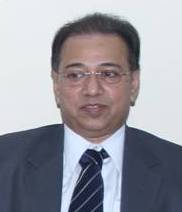
K. S. Radhakrishna Panicker is a former judge of the Supreme Court of India. Prior to that,he served as the Chief Justice of Jammu and Kashmir High Court and Chief Justice of Gujarat High Court.
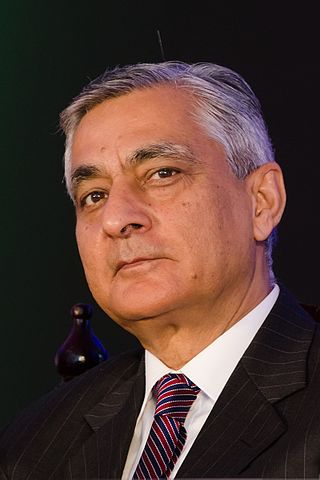
Tirath Singh Thakur is an Indian jurist who served as the 43rd Chief Justice of India (CJI) from 3 December 2015 to 4 January 2017. Before being elevated to the Supreme Court,he served as the Chief Justice of Punjab and Haryana High Court from August 2008 to November 2009 .He has also served as a senior judge in Karnataka High Court from March 1994 to July 2004 and Jammu and Kashmir High Court from February to March 1994.

Sharad Arvind Bobde is an Indian judge who served as the 47th Chief Justice of India from 18 November 2019 to 23 April 2021.
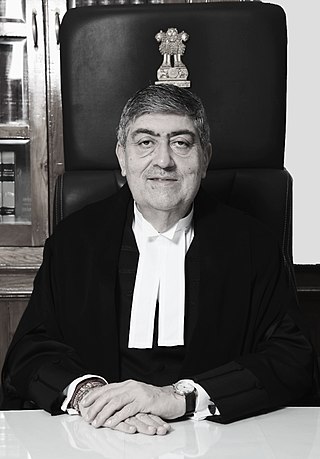
Sanjay Kishan Kaul is a former judge and lawyer who served as a judge of the Supreme Court of India since 2017 until upon his retirement in 2023. He has served as the first puisne judge,senior-most after the Chief Justice of India. Also,he has been the ex officio executive chairman of National Legal Services Authority.

Adarsh Kumar Goel is an Indian judge. He is Chairperson of National Green Tribunal. He is former judge of the Supreme Court of India. He is also former chief justice of the Orissa High Court and Gauhati High Court,and a former judge of the Gauhati High Court and Punjab and Haryana High Court.

National Legal Services Authority v. Union of India(2014) is a landmark judgement of the Supreme Court of India,which declared transgender people the 'third gender',affirmed that the fundamental rights granted under the Constitution of India will be equally applicable to them,and gave them the right to self-identification of their gender as male,female or third gender.

Indira Banerjee is a former judge of the Supreme Court of India and the eighth female judge in history of Supreme Court. Previously,she served as chief justice of the Madras High Court,the second woman to hold the position in India.
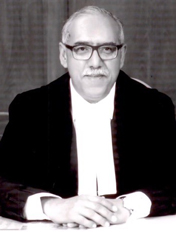
Deepak Gupta is a former judge of the Supreme Court of India and former chief justice of the Tripura High Court and Chhattisgarh High Court. He has also served as a judge of the Himachal Pradesh High Court,serving as the head of its green bench.
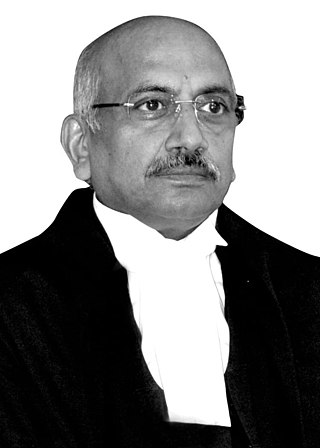
Hemant Gupta is a former judge of Supreme Court of India. He is also a former chief justice of the Madhya Pradesh High Court and judge of the Patna High Court and Punjab and Haryana High Court. He retired on 16 October 2022.

Hrishikesh Roy is a judge of the Supreme Court of India. He is former Chief Justice of the Kerala High Court. He is also former judge of the Gauhati High Court.
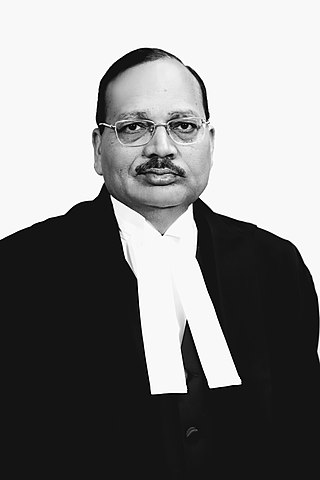
Suryakant Sharma is an Indian judge of the Supreme Court of India,set to become the 53rd Chief Justice of India,if the convention of seniority is followed. Prior to his elevation as judge,Kant was a Senior Advocate and also served as the Advocate General for Haryana.
Ajay Kumar Mittal is an Indian Judge. He is former Chief Justice of Madhya Pradesh High Court and Meghalaya High Court and also former Judge of Punjab and Haryana High Court.
S. Muralidhar is an Indian Judge. He is former Chief Justice of Orissa High Court and Judge of the Punjab and Haryana High Court and Delhi High Court.
Devinder Kumar Jain is a former Indian judge. He is former judge of Supreme Court of India. He is also former chief justice of the Punjab and Haryana High Court and a judge of the Delhi High Court.

Puligoru Venkata Sanjay Kumar is a judge of the Supreme Court of India. He is a former chief justice of the Manipur High Court. He has also served as a judge of the Punjab and Haryana High Court and Telangana High Court.
Haryana Lokayukta is the Parliamentary Ombudsman for the state of Haryana (India). It is a high level statutory functionary, created to address grievances of the public against ministers,legislators,administration and public servants in issues related to misuse of power,mal-administration and corruption. It was first formed under the Haryana Lokayukta and Deputy Lokayukta Act-2002,and approved by the president of India. The passage of Lokpal and Lokayukta's Act,2013 in Parliament had become law from January 16,2014 and requires each state to appoint its Lokayukta within a year. A bench of Lokayukta should consist of judicial and non-judicial members. An Upa-Lokayukta is a deputy to Lokayukta and assists him in his work and acts in-charge Lokayukta in case the position fells vacant before time.
References
- ↑ "Two judges sworn in Supreme Court, strength raised to 30". Zee News. 12 April 2013. Retrieved 12 April 2013.
- ↑ "Justice AK Sikri Breaks Down as Lawyers Bid Emotional Farewell to SC Judge". News18. 6 March 2019. Retrieved 6 March 2019.
- ↑ https://siac.org.sg/wp-content/uploads/2022/07/Justice-Arjan-Kumar-Sikri_Profile_Sept-2019.pdf.
{{cite web}}: Missing or empty|title=(help) - 1 2 3 "Profile of Hon'ble Justice Mr. Arjan Kumar Sikri" (PDF). IICLAM. Archived from the original (PDF) on 1 February 2014. Retrieved 12 April 2013.
- ↑ "List of Senior Advocates" (PDF). Delhi High Court. Retrieved 12 April 2013.
- ↑ "Supreme Court to get new judge; Chief Justice of Punjab & Haryana HC AK Sikri set to be elevated". Bar and Bench. 21 March 2013. Archived from the original on 28 June 2013. Retrieved 12 April 2013.
- ↑ "Justice Sikri set to be elevated to apex court". Financial Express. 20 March 2013. Archived from the original on 25 March 2013. Retrieved 12 April 2013.
- ↑ "Former Judges, Delhi High Court". Delhi High Court. Retrieved 12 April 2013.
- ↑ "Justice A K Sikri appointed ombudsman of Indian Federation of Sports Gaming". The Times of India. 29 July 2019. ISSN 0971-8257 . Retrieved 11 November 2023.
- ↑ "HC upholds Punjab DGP's appointment". Time of India. 12 April 2013. Retrieved 12 April 2013.
- ↑ "Notice to Centre on prisoners in Pak jails". Times of India. 4 April 2013. Retrieved 12 April 2013.
- ↑ "Act fast on molesters, HC to Punjab, Haryana". Times of India. 3 April 2013. Retrieved 12 April 2013.
- ↑ "Judges need to be sensitized in cases of crimes again women". Times of India. 13 January 2013. Retrieved 12 April 2013.
- ↑ "Tihars juvenile woes: Over 200 shouldn't be in jail". First Post. 27 March 2012.